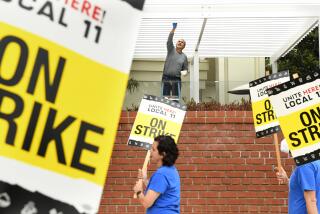Deal between L.A., DWP workers finalized despite looming legal fight

The Los Angeles City Council on Tuesday completed a salary deal with the powerful union that represents Department of Water and Power employees, over the protests of city workers who do not currently have jobs at the utility.
The council signed off on an agreement to hike the retirement age for future DWP employees and avoid pay increases for three years.
Those deal points are part of a much larger agreement to settle a three-year-old lawsuit filed by members of the DWP union over the utility’s practice of hiring employees from other city agencies. The council’s decision could leave the city trading one legal battle for another.
Leaders of the Coalition of L.A. City Unions, whose members don’t work at the DWP, said they would continue challenging parts of the deal that pare back retirement benefits for city workers who might seek jobs at the utility in the future. More than 1,600 city employees secured posts at the DWP between 2004 and 2010, some of them looking to escape the threat of layoffs in departments hit hard by the recession.
Those transfers forced ratepayers to absorb an additional $183 million in retirement costs, according to city budget officials.
The latest labor fight highlights just how coveted jobs are at the DWP, which has historically provided higher pay, better benefits and more job stability. The coalition, which represents six employee groups, says its members have a continuing right to the benefits that have been provided to city workers who went to work at the DWP. Those benefits cannot be changed without full negotiations, the group’s lawyers contend.
Tuesday’s vote locked in new financial barriers to employees who seek to transfer to the DWP in the future. If those provisions are removed, the entire pay agreement — including the salary savings — will unravel, said City Administrative Officer Miguel Santana, the high-level budget official.
“If [the coalition’s] goal is to go back to a situation where city employees can transfer to the DWP and have the ratepayers absorb the additional pension cost, that cannot be done,” he said.
Coalition Chairwoman Cheryl Parisi called the council’s decision misguided. “Employees who promote or transfer through the city’s civil service system shouldn’t be penalized,” she said.
Mayor Eric Garcetti and the council announced the terms of the DWP salary deal in August, saying it would save $415 million over the next four years, in large part by eliminating pay increases. Under the agreement, workers with the International Brotherhood of Electrical Workers Local 18, the DWP’s biggest union, would not see any raises until October 2016, when a 2% pay hike would be awarded.
The deal with the IBEW pares back pension benefits for DWP workers hired after Jan. 1. And it reduces the retirement costs incurred by the utility when it hires employees from other city agencies.
Brian D’Arcy, who heads IBEW Local 18, called the agreement a fair one. But other city unions sent a letter last month calling on the city’s leaders to cease and desist from imposing elements of the deal that would affect future employee transfers. Coalition leaders have warned they would take “all necessary actions” to protect benefits that are now in place.
Though DWP employees gave up a scheduled raise in October, the coalition has two scheduled for the fiscal year that began July 1. Coalition members received a 1.75% boost last summer and will get an additional 5.5% pay hike Jan. 1.
Much of the dispute between the coalition and city leaders focuses on the concept known as “reciprocity.” Under that system, the DWP paid for much of the pensions of city workers hired away from other departments. In return, other city departments pay for much of the pensions of workers they hire away from the DWP.
Reciprocity was supposed to be a system where the costs balanced out on each side. But in recent years, the flow of public employees went mostly in one direction — from city departments to the DWP.
IBEW members who serve on the DWP pension board sued the city in 2010, saying the city should reimburse the utility for the cost of so many employee transfers. The council agreed to settle that lawsuit Tuesday by reducing the pension cost incurred by the DWP when it hires a city worker.
More to Read
Start your day right
Sign up for Essential California for news, features and recommendations from the L.A. Times and beyond in your inbox six days a week.
You may occasionally receive promotional content from the Los Angeles Times.







